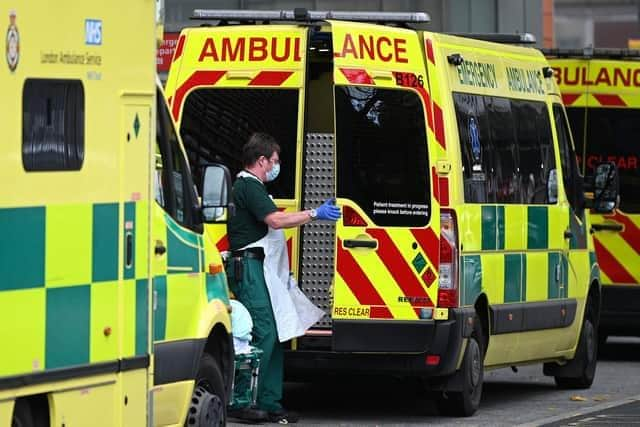NHS launches campaign to raise awareness of lesser-known heart attack symptoms - which do you know
and live on Freeview channel 276
Around seven in 10 people survive a heart attack, and for those who reach the hospital early to receive treatment, this figure rises to more than nine in 10 people.
However, there are several symptoms which appear in the early stages of a heart attack that many people do not know.
Advertisement
Hide AdAdvertisement
Hide AdThe NHS is launching a new campaign to encourage people to dial 999 as soon as they experience the early symptoms of a heart attack.
This comes after the latest figures show there were more than 84,000 hospital heart attack admissions in England during a year long period between 2021 and 2022, up by more than 7,000 compared to the previous year-long period when fewer people came forward for care during the pandemic.
The campaign is designed to help people to know when to dial 999 as the number of admissions for heart attacks returns to pre-pandemic levels.


Symptoms of a heart attack
According to the NHS, the symptoms of a heart attack are:
• Squeezing or pain across the chest
• Sweating
• A feeling of uneasiness
• Pain that radiates down the left arm, or both arms, or to the neck, jaw, back or stomach
• Difficulty breathing (snoring or rasping)
• Rapid heart beat
• Low or undetectable heart beat
• Blue or pale tingling of knees, hands and lips
• Nausea or coughing up blood
• Unconsciousness
• Seizures or fitting
Advertisement
Hide AdAdvertisement
Hide AdResearch by the NHS reveal that whilst 70% of those surveyed understood that pain in the chest is a symptom of a heart attack, just 41% knew sweating was a symptom.
Only 27% understood feeling weak, lightheaded or a feeling of general unease were also symptoms.
There is also a push to raise awareness of heart attack symptoms in women - as their risk of a heart attack increases after the menopause.
What is a heart attack?
A heart attack happens when the supply of blood to the heart becomes blocked, which can starve it of oxygen potentially causing serious muscle damage. The person will be conscious and breathing.
Advertisement
Hide AdAdvertisement
Hide AdA cardiac arrest, however, occurs suddenly and without warning with the person quickly losing consciousness.
Their heart stops, they will have no pulse and sadly people experiencing a cardiac arrest will usually die within minutes if they do not receive treatment. A heart attack can lead to a cardiac arrest.
Professor Nick Linker, cardiologist and NHS national clinical director for heart disease, said: "Cardiovascular disease causes one in four deaths across the country, so it is vital that people are aware of the early signs of a heart attack.
"Every moment that passes during a heart attack increases heart muscle damage and nearly all of the damage takes place within the first few hours, so if you experience symptoms such as a sensation of squeezing or tightness across the chest alongside sweating, nausea, or a sense of unease, please call 999 so you have the best chance of a full recovery."
Advertisement
Hide AdAdvertisement
Hide AdDr Charmaine Griffiths, chief executive at the British Heart Foundation (BHF), said: "Every minute matters when somebody is having a heart attack, and could be the difference between life and death.
"Even if the symptoms don't seem severe, such as a feeling of squeezing or tightness across the chest - call 999 immediately. A heart attack is a medical emergency and immediate action could save your life."
Comment Guidelines
National World encourages reader discussion on our stories. User feedback, insights and back-and-forth exchanges add a rich layer of context to reporting. Please review our Community Guidelines before commenting.
